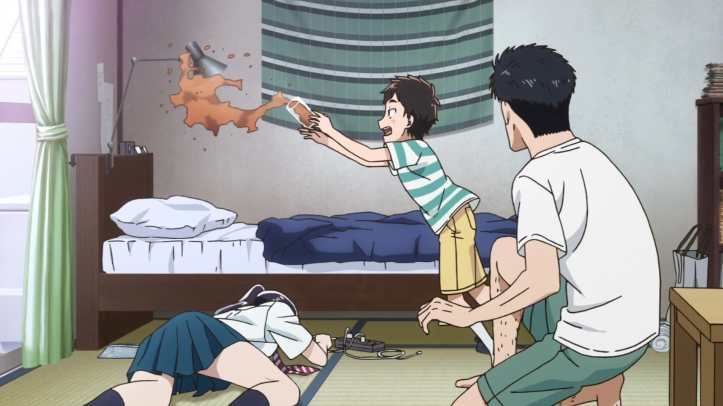I don’t think it would be inaccurate to say that the entire anime watching community is still collectively scarred by Usagi Drop when it comes to stories about age-gap romances. And they should be!
[For those not in the know, just refer to the last bit of the Plot Synopsis on Wikipedia]
Judging by premise alone, one would think that After the Rain would seek to appeal to the same kind of thing. Fortunately for all of humanity, After the Rain offers something completely different, with the care and dignity that a story about a complicated age-gap relationship needs to have!

After the Rain follows 17 year old Akira Tachibana who has recently developed feelings for Masami Kondo, her 45 year old manager at her part-time job.
Tachibana used to be a star track player before an injury to her achilles tendon put her out of commission for a long time, resulting in her becoming depressed and detached from her friends and life in general. Kondo is a divorcee with a young son who doesn’t quite have himself together. He’s scatter-brained, messy, and feels like his life isn’t really going anywhere. Tachibana catches feelings for Kondo when she starts working at the Garden Cafe and he shows her small acts of normal, everyday kindness. She sees a spark in him that she falls for, knowing full well how odd it is for her to be attracted to a man more than half her age. She confesses to him very early on in the show, and the series kind of jumps off from there.

The show makes its stance known early on that this isn’t a show about indulging in some sort of sexual fantasy. Their relationship is an honest predicament between two characters that are written to be real people that react to things the way real people would. Tachibana struggles with complex feelings about herself and her life, in many contexts other than her feelings for Kondo. Kondo struggles with midlife crises and a generalized dissatisfaction with the life he lives versus the life he wants/wanted to live. Neither character ever comes off as some escapist, idealized fantasy person. They are super real, and that authenticity is what makes this show special.
However, all that aside, this is me reflecting on the series in hind-sight. Throughout most of the show, especially early on, I was crossing my fingers to the point of bruising (metaphorically) for them to “please not go there.” And they don’t. But there are some moments of awkwardness where the characters get put into situations where lines could be crossed. There’s a few moments that solidified the show’s boundaries very clearly, but here’s one that stood out to me:

In episode 5, there’s a scene where Kondo’s son Yuto is fetching Tachibana a cold glass of tea because she has over heated by being trapped in a closet (long story). He trips and spills the tea all over her back with the wetness of the tea revealing her bra-strap underneath her white shirt. Kondo notices, sees the bra strap, and the very next shot is a lingering view of just his eyes, clearly and definitively looking the opposite direction while asking Yuto to fetch her a clean shirt. It was that scene in the “anime absurdity” of it all that told me “yeah, I don’t think this show is going in that direction. Whew!” There are a couple more opportunities for lines to be crossed, but they never really are. Those moments in addition to the context of the rest of the story, assured me that this is indeed intended to portray real people with a real story going on, not a vehicle for scandalousness.
Though I’ve spent all of this review so far talking about it, Tachibana and Kondo’s connection is honestly more of a vehicle to explore other feelings and relationships rather than the main focus of the story itself. Much of the latter half of the series is Tachibana coming to terms with her strained relationship with her best friend, Haruka. There’s also a parallel story going on where Kondo reconnects with a college friend who went on to become a famous writer, something Kondo dreamed of for himself that eventually led to his divorce due to misplaced priorities.


Essentially the overall theme the series ascribes to is that the lines between youth and adulthood are only as strict as you make them out to be. Tachibana comes to understand that her friendship with Haruka is bigger than whatever momentary sadnesses she may be going through, and that her anxieties aren’t worth sacrificing a good friendship over. Kondo learns that even though life has beaten him down, he can still find the passion inside himself to pursue his dreams and be the writer he wants to be. Through the two of them understanding each other and those around them, they come to understand more about themselves. I know that sounds kind of trite and vague, but it really is quite genuine and honestly funny at points!
Kondo is a 100% dad, and I mean that in the purest form of being a goofy, punny awkward guy who tries to be “hip with the kids at work” but fails because they think he kinda smells (until they bond together over a hamster). Tachibana is highly expressive, wearing her emotions on her sleeve, in her face, and in her body language. The way she interacts with her coworkers and Kondo lead to some cute awkwardness that gave me a couple of good giggles, and the warm-fuzzies when she becomes a big-sister of sorts to Yuto.

The secondary cast is also pretty great as well. This is probably the only anime I have ever seen where the “boy who wants to date the girl who doesn’t like him” character has actually been charming, funny, and not creepy in the slightest. Typically I hate those kinds of characters but Yoshizawa is a truly kind dude, albeit awkward. I could go into more depth on the other characters, but I’ll save them for you to experience!

One incredible element of the show from a directorial standpoint is it’s use of silence and non-verbal story telling. There are many times where the show creates a mood using Tachibana’s facial and body language rather than internal monologue, which I always find is a much better and more honest way to convey the emotions of a story. You can SAY “I felt sad today” but After the Rain SHOWS it, almost to the point of brilliance. The slightest furrow of her brow, the way she ties up and lets down her hair, the gleam and glare of her eyes, are expertly executed to really allow the audience into her experience and feel exactly what she’s feeling.

Overall, I really loved After the Rain. It’s so genuine, so enjoyable, so funny, and so heartwarming that I’d encourage anyone to check it out, especially if you find yourself in a slump. I think the lessons learned in this show through warmth and empathy are something anyone can take something away from.
After the Rain is streaming on Amazon Prime and in print from Vertical Comics and Right Stuf.

I was finding this one hard to really get into when I tried it and then I ended my subscription to Amazon and didn’t catch the end. Part of me wants to see how it goes, the other part kind of realises that it wasn’t really working for me or it was just taking a long time to warm up to the characters.
Thanks for sharing your thoughts on it. It was fun to read.
LikeLiked by 1 person
Thanks for reading! I appreciate it. And yeah, if it wasn’t clicking with you, that’s fine. I really enjoyed it personally because the characters grabbed me early on, but that won’t always happen for everyone. If you do go back to it at some point, let me know!
LikeLiked by 1 person
Yes, “surprisingly wholesome” sums up this series so well.
LikeLiked by 1 person
Haha, I thought so too.
LikeLike